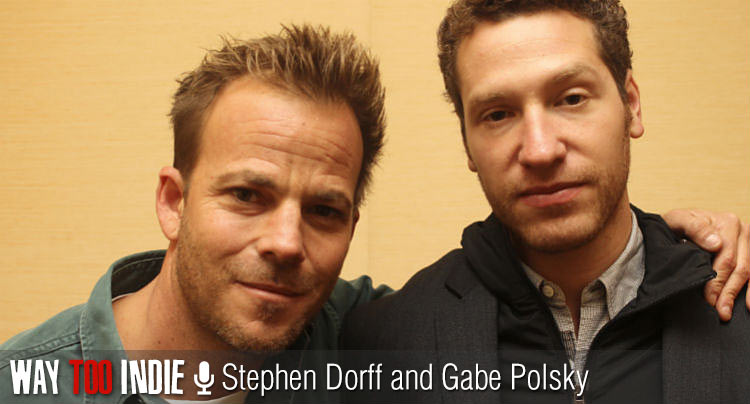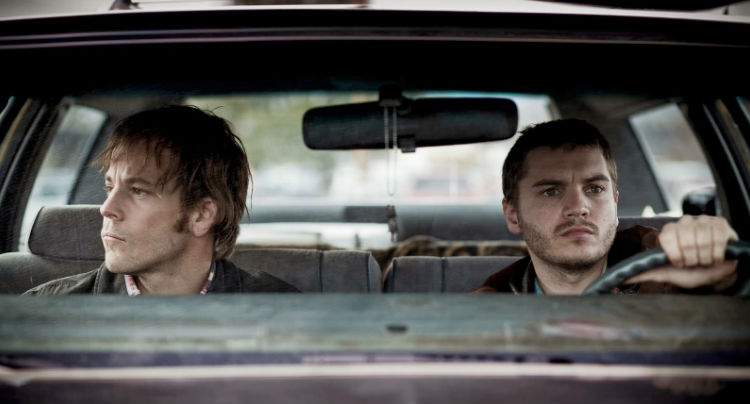Stephen Dorff and Gabe Polsky talk ‘The Motel Life’, Roles Worth Fighting For

Two brothers, Frank and Jerry Lee Flannigan, are forced to live life on the run after Jerry Lee accidentally hits and kills a little boy while driving. With their lives slowly falling apart, the brothers must rely on and support each other through cold winter nights in the desert towns of Nevada, using their imagination to strengthen their intense brotherly bond.
The Motel Life, co-directors Gabe and Alan Polsky’s adaptation of Willy Vlautin’s debut novel, stars Emile Hirsch and Stephen Dorff as the brothers. Also starring Dakota Fanning and Kris Kristofferson.
Stephen Dorff and Gabe Polsky sat with us during the Mill Valley Film Festival to talk about why it took so long for the film to be released, how hard Stephen fought for the role of Jerry Lee, why digital cameras are irritating, the advantages of working with brother co-directors, and more.
The Motel Life opens this Friday, November 8th in New York, San Francisco and select cities.
How does it feel to be in the Bay Area, showing the film off at the Mill Valley Film Festival?
Stephen: It feels great to show the movie. We had a great response in Rome, but then we had this big gap in time.
That was last year, wasn’t it?
Stephen: Yeah, in November or December. Now, the cut is rocking and we’re ready to go, opening November 8th.
What’s been going on with the film in the last year?
Gabe: We’ve been planning our distribution, basically.
Stephen: We decided we didn’t want to release in the summer. This is a fall movie. This is a cold movie that should be up with the big movies in the awards run. It’s that kind of film and it’s gotten a good response so far.
Gabe: Leading up to the release, we’re utilizing all these festivals–Woodstock, Chicago, Philadelphia, etc.–just to generate and build a buzz.
Stephen: We’re like the underdog; we’re gonna go tear up the streets. Jerry Lee’s coming out in full force!
Stephen, how did you get involved with the film?
Stephen: I just read the script, man. As an actor, I get sent a lot of scripts. Somewhere had just opened, and it was kind of like my resurgence time, I guess. Sofia had given me such a great role in her fourth film. I was coming from a whirlwind European trip where the movie went down like gangbusters. We won pretty much everything and felt like the king of the world. I came back to a pile of scripts, and I was like, “Whoa, I’m cool again! They’re sending me scripts!”
I was reading these Hollywood scripts and I wasn’t into them. On the bottom of the pile was The Motel Life, with the cover letter that said, “Emile Hirsch set to play Frank Flannigan. I liked that name, “Flannigan”. I liked the title. I was intrigued. I read the script and I said, “Why is this on the bottom of the pile?” My agent knows I like Emile Hirsch, knows I’m friends with him. What the hell? I immediately called my agent and said, “Forget all these other scripts. This is the movie I want to be in. I want to play Jerry Lee.
Then, it became one of those stories you hear about when an actor gets something in his head and he just won’t stop. I had a nice meeting with the Polskys, but they were going to Sundance and I was going to Tokyo with Sofia. I knew that they had a month before this thing started shooting. I just wanted to stay on them. In my heart I felt like they didn’t see me in this role. I know directors–I’ve been doing this too long.

Were Stephen’s suspicions true?
Gabe: No. I think we wanted to do our due diligence. We weren’t ready to make a decision. We had other actors come in and do chemistry reads and figure things out. Stephen was very persistent, and that made a huge difference. We got to know him a bit more, and he read with Emile.
Stephen: I got in a room and they said they needed me to read with Emile. I thought, Jerry Lee’s too good. I’m gonna fight for Jerry Lee, because that’s a character I don’t read. They just don’t come around that much. You read things every once in a while. I read Dallas Buyers Club. I knew exactly what those two parts were, you know what I mean? My friends produced it. I’m a machine. Every good film that’s being made, I usually read. I want to know what my competition’s doing. It’s a game to me. It’s an art form. I have a brain that likes to feed off of those things, so I knew I had something special here. I wasn’t going to let it go to somebody else.
Gabe: When we read him with Emile, we realized that there’s something in Stephen, his spirit, that the character had deep in his core. That’s what tipped it for us. He had this energy.
Stephen: I don’t get a chance to audition, ever, because I get offered movies. I do them or I don’t do them. This one kind of energized me.
Was it fun to get to fight for it?
Stephen: A little bit, yeah. In the room, I felt that these guys were smart. They directed me smartly. I loved what they said. I could see myself working with two directors–I’d never done that. I’ve always had one director, one captain. I thought, “Is this going to be weird?” In the end, it was beautiful the way they worked it. They’re different. Everybody’s different, the way Jerry Lee and Frank are different, the way me and my brother Andrew are different. It’s the nature of who we are. I got great notes from Gabe that Alan wouldn’t have given me, but Alan would say things that complemented what Gabe was trying to say. It was a really cool balance. I’m really thankful that I got the fuckin’ role, because out of all the characters I’ve played, I think he’ll go down as one of my favorites.
He was worth fighting for. Even if I didn’t get the part, I’m not going to go over to Gabe’s house with a gun and go crazy, but there are those stories you hear. Holly Hunter and The Piano. Jane Campion didn’t want to know her! My agent at the time worked with Holly Hunter, and Holly put her on a plane, flew her to Australia, knocked on Jane’s house door, read for the role, and got it. Then, she won the Oscar. You’ve got to fight these days.
As an actor, you’ve got to go with what’s out there. I’m not a real writer, so it’s not like I’m pumping screenplays out of my head. If those scripts aren’t coming to me, I can’t do my job. Unless I want to do dinner theater or work on the streets of San Francisco reading poetry, I’ve got to make the filmmaker want me.
So after you finally won the role, how did it feel to shoot the movie?
Stephen: We shot the whole movie in 24 days, in the snow, on film. I love that they shot on film, like Sofia. It felt nostalgic to me, because you don’t get to shoot on film anymore. We’re always on Sonys or Reds. Those little chips bug me. I feel weird when they put those in. “We gotta load the chip!” Even on Public Enemies. I’m working on this 100-million-dollar movie and it’s, “Let’s load the chip!” I love the idea of mags and somebody rolling film. That’s just me–I love movies and I love old filmmaking. I thought for the soul of this film, it was nice to shoot it on 35mm.
The film looks really great.
Stephen: Roman Vasyanov is one of my favorite DP’s. He’s been doing really well. He went on to do End of Watch.
Gabe: He shot Charlie Countryman. He shot The East. We didn’t have time to move the camera around too much. We had to be very economical. You can still make the frames beautiful…
Stephen: …without 50 feet of track or a huge crane shot.
Gabe: Yeah. Every frame could be a piece of art.
Stephen: It’s one of the greatest steadycam shots, the one where Emile goes into the bar to watch the Tyson fight. That’s a one-shotter.
Gabe: We wanted to capture the mood and the gritty feel, but also have it feel kind of classic, too, you know what I’m saying? Not too crisp, but have this sort of softness about it.
The shot of the brothers in the car in the snow is beautiful.
Stephen: I love that guy. I want to work with Roman again. I love the shot where I burn the car on the snow. There are some great images in there, kind of like postcards.
The boys did it right, and I had a feeling of that during the Emile casting. Emile is a grounded actor and is so real. He reminded me of myself when I was his age. I saw him in that movie, The Girl Next Door, and he was fucking great in it. I went up to him at the premiere of Old School or something and told him he was a great actor and that he reminded me of me, which is kind of a weird thing to say. He probably thought, “God, that guy Stephen Dorff is kinda crazy!” I told him, “We’re gonna play brothers one day.” I’ve always gone on my instincts in my life and in my work. I just know things. I can feel things. Sure enough, it happened. I feel like he’s one of my brothers, you know?
What was your approach to the role of Jerry Lee? You completely disappear.
Stephen: I really wanted to look different. That’s easy, that stuff; you can lay scars, you can grow your hair out. You can go a little too far–at one point, we did go a little too far–but we always pulled it back. I think the inside of Jerry Lee is really what I had to find. That was something that happened in a few different moments. It happened during a rehearsal that me and Emile had in this little office room where we just sort of played through the scenes. It happened at a restaurant, at a bar in Reno. I was working on the big speech that’s at the beginning, in the car. It sort of gets you into the movie. That speech was fucking hard, and I didn’t know how to tell the story without making it to “sob-story” but at the same time being frightened that I’d killed someone. And now, I have to bring this other dilemma onto my brother, who has other dilemmas already. We were working on it at that restaurant, and I remember getting into it and finding something there. Once we got to Carson City where the hub of Jerry Lee’s performance takes place–the hospital, the final motel–it came together there.
